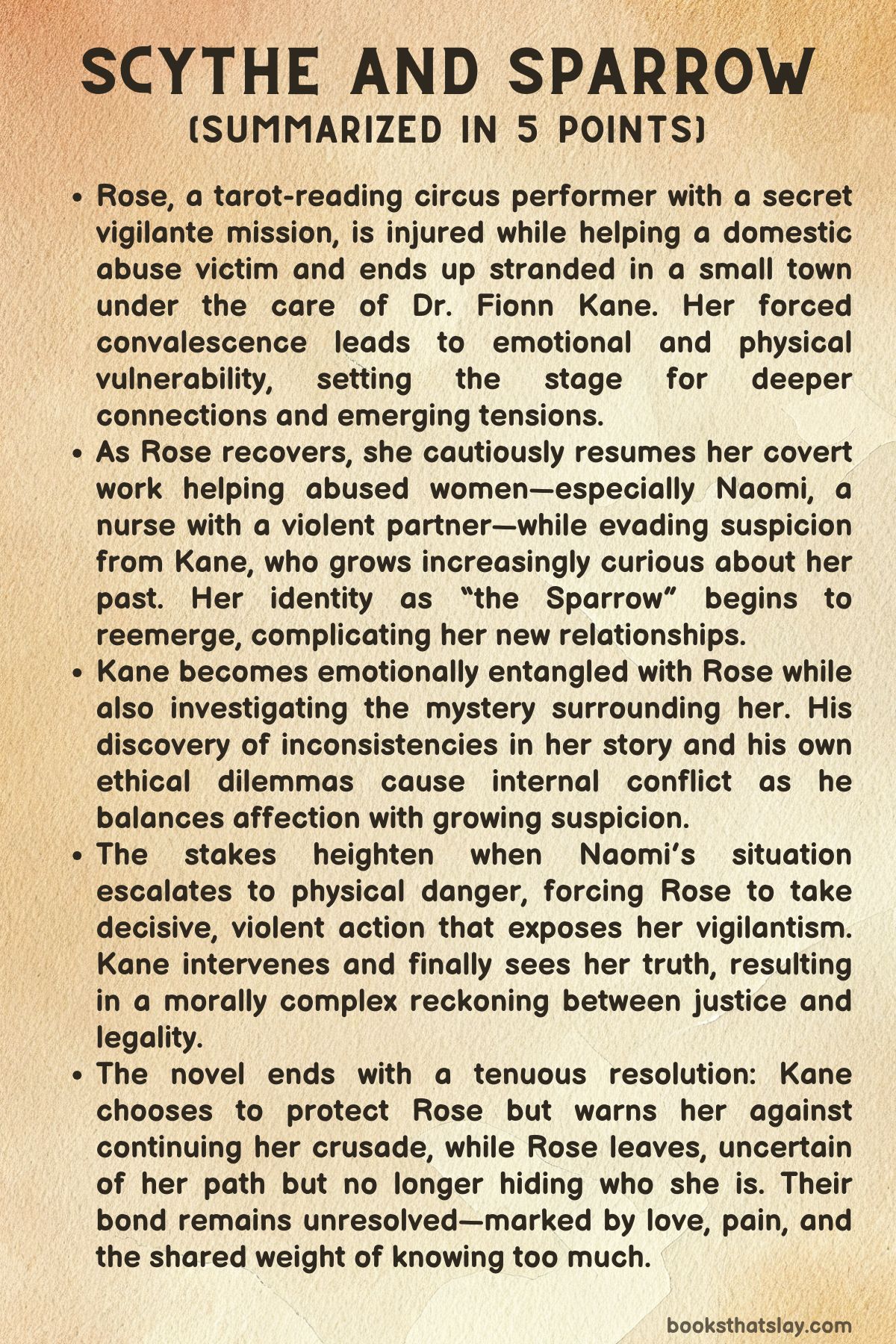Scythe and Sparrow Summary, Characters and Themes
Scythe & Sparrow by Brynne Weaver is a dark romantic thriller that blends gritty realism with emotional vulnerability, wrapped in a small-town mystery.
At its heart is Rose, a traveling tarot reader and vigilante known as the “Sparrow,” who rescues women from abuse—often through dangerous and violent means. When a mission goes wrong, she’s forced to recover in a quiet town under the watchful eye of Dr. Fionn Kane, a compassionate but suspicious doctor. As their connection deepens, so do the secrets and stakes, culminating in a story of moral ambiguity, trauma, and complicated love.
Summary
Rose, a traveling tarot reader with a haunting past, operates under the guise of circus mystique but hides a much darker role: she’s the “Sparrow,” a covert vigilante who helps women escape abusive partners—often permanently.
Her secret mission brings her to a breaking point when an attempt to help a woman named Lucy ends in violence. Rose is gravely injured and forced to abandon her circus family, landing in the quiet trailer park of Prairie Princess.
Enter Dr. Fionn Kane, a compassionate small-town physician who finds Rose breaking into his clinic in the middle of the night, bleeding and semi-conscious. He treats her injuries, particularly a broken leg, and becomes reluctantly entangled in her enigmatic world.
Rose, stranded by injury and alone, begins to adjust to her new environment. But even as she heals, she remains restless, knowing her work is unfinished.
As Rose and Kane circle each other with growing tension, their connection builds—a mixture of suspicion, care, and undeniable attraction. Rose hides her true identity and purpose while using her tarot skills to quietly help local women, like Naomi, a nurse enduring abuse.
She is drawn into Naomi’s situation, planning her next move carefully.
Meanwhile, Kane grows increasingly uneasy as he notices inconsistencies in Rose’s story, especially when he learns of an unsolved assault involving Lucy’s abusive husband, Matt Cranwell—whose driver’s license Rose inexplicably had when she was found.
Through a mix of flashbacks and reflection, the novel reveals the roots of Rose’s mission: a history shaped by personal loss and abuse. Her trauma is both her compass and her curse.
As she regains her physical strength, her resolve hardens again—she must help Naomi, even if it means confronting another violent abuser.
Tensions escalate as Kane uncovers more of Rose’s past. While he wrestles with ethical dilemmas—should he report her? help her?—he also finds himself emotionally tethered to her.
They share moments of intimacy, vulnerability, and even joy, but the shadow of Rose’s actions looms large.
As Naomi’s situation worsens, Rose prepares for a final act of intervention, knowing full well the risks.
A violent confrontation follows. Rose protects Naomi, but the cost is steep: physical injuries, emotional scars, and the growing likelihood of discovery. Kane intervenes, now fully aware of who Rose is and what she’s capable of. Though he doesn’t condone her methods, he can’t deny the justice in her intentions.
With law enforcement closing in, Kane is faced with a painful decision—protect the woman he’s come to love or uphold the law. He chooses Rose but not without conditions.
He urges her to stop, to find a new way, warning that her path leads only to destruction. Rose listens but remains uncertain. Their relationship, forged in fire and fear, teeters between hope and heartbreak.
In the end, Rose leaves the town, returning to the circus but with emotional baggage heavier than before. The final chapter, “Three of Swords,” marks a poignant farewell between her and Kane.
There is no neat resolution, only the sense that both characters are forever changed—and that their story, unfinished, lingers just out of reach.

Characters
Rose
Rose is the central character of Scythe & Sparrow, marked by complexity and duality. On one hand, she is portrayed as a strong, independent woman, willing to put herself at risk to protect those who are vulnerable, particularly women trapped in abusive situations.
Her alter ego, “Sparrow,” serves as both her mission and her burden, symbolizing her desire to save others from the pain she has endured. As a tarot reader, Rose uses her intuitive abilities to connect with those around her, offering them guidance and comfort while hiding her own deep trauma.
Her past is one of pain and loss, particularly tied to domestic violence, which shapes her vigilantism. Throughout the novel, her emotional journey is one of healing and self-discovery, but it is also one of profound isolation as she struggles to trust others, especially Dr. Fionn Kane, whose protective instincts grow stronger as the story progresses.
Fionn Kane
Dr. Fionn Kane is the emotionally grounded, yet morally conflicted counterpart to Rose. A small-town doctor, Kane is introduced as someone who values order and ethics but becomes increasingly entangled in Rose’s world.
Initially drawn to her by his protective instincts, he grows emotionally and intellectually fascinated by her strength, vulnerability, and the dark secrets she carries. As Rose’s physical and emotional wounds begin to heal, Kane’s affection for her deepens, though he is constantly torn between his professional duty and personal feelings.
His suspicions about Rose’s past lead to a moral dilemma, as he grapples with the idea of protecting someone who operates outside the law for a cause he finds both admirable and dangerous. His role as a physician allows him to care for Rose and help her recover, but it also places him in a position where he must choose between keeping her secret and confronting the truth of her actions.
Naomi
Naomi is introduced as a nurse working at the hospital where Rose is recovering. She becomes a key figure in Rose’s mission, representing the vulnerable women who suffer in silence under the thumb of an abuser.
Naomi’s own trauma mirrors the experiences Rose is determined to help her escape, and their bond grows as Rose guides Naomi toward freedom. Naomi serves as a symbol of the potential for transformation and the emotional toll of escaping an abusive situation.
As Rose becomes more involved in Naomi’s life, the reader sees how the two women are linked not only by their shared experiences of suffering but also by the solidarity they find in each other. Naomi’s struggle is not just physical but psychological, as she learns to reclaim her own strength with Rose’s help.
José
José, the circus ringmaster, serves as a secondary yet significant character in the story, embodying both authority and a sense of moral ambiguity. He is the one who informs Rose that she must remain behind to recover after her injury, highlighting the tension between her desire for freedom and her need for healing.
His role in the circus, and his connection to Rose’s past, adds another layer of complexity to the narrative. He represents the world Rose is trying to escape from, and his presence serves as a reminder of the life she left behind—one that was filled with both purpose and pain.
Themes
The Price of Vigilantism and Justice
A core theme of Scythe & Sparrow is the complex nature of justice and the moral dilemmas that arise from taking matters into one’s own hands. Rose, the protagonist, steps into the role of a vigilante, driven by her past trauma and a desire to help others escape the cycle of abuse.
Her actions often blur the lines between right and wrong, as she wrestles with the consequences of inflicting harm on those who are perpetrators of abuse. The ethical weight of her decisions—whether her vigilantism is justified—haunts her throughout the novel.
The theme explores how the thirst for justice can sometimes override moral considerations, questioning if the ends truly justify the means when personal emotions and past wounds are in play. Rose’s internal conflict as she struggles with this moral paradox is compounded by her evolving relationship with Kane, who offers an alternative to her path of lone justice, yet is also drawn into her world.
Trauma, Healing, and Identity
The novel delves deeply into the psychological and emotional impact of trauma on its characters. Rose’s backstory reveals a woman shaped by loss and abuse, which propels her toward becoming a protector of other women in similar situations.
The theme of healing unfolds as Rose attempts to mend her physical injuries, but her emotional scars are far more persistent. The narrative shows that healing from trauma is not linear and is often complicated by the personal choices a victim must make, such as confronting abusers or accepting help from others.
Rose’s journey is marked by her struggles to rebuild her sense of self while reconciling with her painful past. This exploration emphasizes the tension between a desire for independence and the necessity of vulnerability in forming authentic connections.
The novel invites readers to question how much of one’s identity is shaped by their trauma and whether true healing can be achieved without fully confronting the past.
The Complexity of Love and Trust in Relationships
In Scythe & Sparrow, the relationship between Rose and Kane becomes a vessel through which the themes of love, trust, and vulnerability are explored. Their dynamic evolves from mere attraction to a deeper emotional connection, but it is fraught with tension.
Kane is drawn to Rose’s strength, resilience, and the mystery surrounding her, yet he is also disturbed by her secrets. His deepening feelings for her force him to confront his own ethical boundaries as a medical professional and as a man who cares for her.
Meanwhile, Rose grapples with her mistrust of others, shaped by her past experiences. She has learned to protect herself emotionally by building walls and maintaining secrecy, even with Kane.
This theme highlights the difficulty of truly trusting another person when betrayal is a constant fear. The novel explores how love in the midst of secrecy and moral ambiguity can be both redemptive and destructive.
As the stakes grow higher, both characters must decide whether they can trust each other fully, even when their worlds are filled with uncertainty and danger.
The Search for Belonging and Isolation
Isolation is another central theme in the novel, portrayed through Rose’s physical and emotional detachment from others. After her injury, she retreats into a world of solitude in the trailer park, cut off from the circus family she once belonged to.
This sense of being an outsider is compounded by her role as a vigilante, where she must keep her true identity hidden, even from those who care about her. Rose’s sense of alienation reflects a broader theme of the struggle to find a sense of belonging when one’s identity is shaped by trauma and secrets.
In contrast, Kane’s protective instincts and growing feelings for Rose place him at the center of her personal struggle. As they navigate their relationship, both characters face the challenge of overcoming their isolation—Kane from the complexities of his ethical code, and Rose from the emotional barriers she has constructed to shield herself from further pain.
The theme of belonging explores the costs and challenges of connecting with others while carrying the weight of one’s past.
Ethical Dilemmas in the Pursuit of Justice
The novel intricately weaves the theme of ethical dilemmas, particularly in the context of Rose’s vigilantism. Throughout the narrative, readers are forced to grapple with questions about right and wrong in the pursuit of justice.
Rose’s actions, although motivated by a desire to protect vulnerable women, often involve violence and manipulation, raising the question of whether her crusade can ever be truly moral. Kane, who represents a more conventional sense of justice, struggles with the tension between his duty as a doctor and his moral responsibility to protect Rose.
This theme highlights the complexities of justice in a world where the legal system fails to protect the vulnerable, forcing individuals to step outside the law to right perceived wrongs. The novel asks whether the law should be the ultimate arbiter of justice or whether personal moral codes can be trusted to make decisions when the system is inadequate.
The push-and-pull between personal morality and institutionalized justice underpins much of the conflict between the characters, leaving the audience to question what constitutes true justice.


